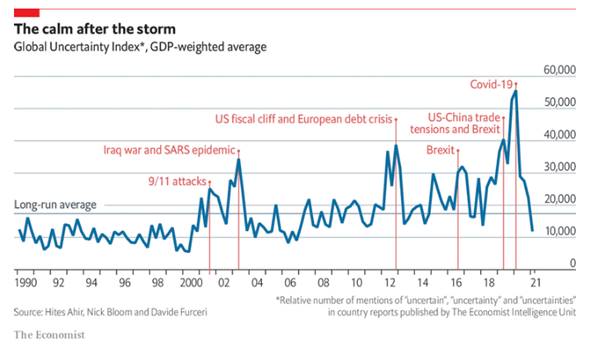Weekly Market Comment: May 28th
It’s time to end quarantines and inside jokes
There is now more light at the end of the Covid-19 tunnel than ever before. For example, total infections in the US have plummeted to below March 2020 while Canada’s average total case count is a quarter of its peak rate.
About 55% of Canadians have had at least one vaccine (vs. 50.5% of Americans) and those with both doses has grown to 5%. Moderna will be shipping 2 million more vaccines by June 14th, enough to cover doses for 6% of the Canadian population over the age of 12 (note: there are 38 million people in Canada, of which approximately 5 million below the age of 12). This is all durable progress!
There was also a very positive study released last week finding that spacing second vaccine doses by 12 weeks instead of 21 days makes for 3.5 times more antibodies in older recipients. "The approach taken in the U.K. for delaying that second dose has really paid off," Gayatri Amirthalingam, consultant epidemiologist at Public Health England, told reporters.
Considering the positive covid news, no wonder The Economist’s Global Uncertainty Index, a quarterly measure of global economic and political turmoil, has plummeted toward a state of banal normality. A 14 year low, in fact.

A not so secure homeland
The U.S. Department of Homeland Security issued its first-ever cybersecurity regulations for pipelines after the recent Colonial hack. For starters, all confirmed or suspected attacks must be reported to DHS via an appointed cybersecurity coordinator who is available 24/7. They also must review their current cybersecurity practices and identify shortfalls and how they are going to fix them. In other words, companies must actually think about this threat and have a plan in place, and these findings and recommendations must get provided to the relevant government agencies within 30 days.
Not all regulations are bad and this is a step in the right direction, making certain safety rules mandatory and not merely voluntary. Be it to extract money or inflict pain on society, such attacks are a modern form of terrorism.
In the meantime, an “infrastructure” package continues to get hashed out in Washington. Raymond James political analysts in Washington believe a $2-3 trillion bill will advance without republican support, further supported by President Biden’s budget released today outlining $6 trillion in funding for fiscal 2022. That’s up from an already eyewatering $4.8 trillion in spending for this fiscal year.
Despite this unprecedented uptick in federal spending, this is net of the budget’s plan to increase the capital gains inclusion rate (also a type of ransomware?) for top earners retroactively to April 2021 when the plan was first announced. While not certain to make the final bill, the purpose of the retroactive call is to eliminate an investor’s desire to sell to meet a deadline, almost certain to cause market volatility.”
How thoughtful of them.
Noteworthy links:
- The U.S. Army’s latest night-vision tech looks like something out of a video game
- Biden asks intelligence agencies to ‘redouble’ efforts to determine coronavirus origins
- The man who sold millions in counterfeit wine to rich collectors
- Photos of the Week
- Louvre gets its first female leader in 228 years
- Sleep hygiene: 8 ways to train your brain for better sleep
- Eric Carle, ‘The Very Hungry Caterpillar’ Author, Dies at 91
- Hong Kong woman breaks record for fastest ascent of Everest: official
Musings Beyond The Markets
“The greatest trick corporations ever played was making us think we could recycle their products,” wrote the bi-line of the New York Times op-ed video titled The Great Recycling Con.
We’re talking plastics recycling specifically, where only 8.5% of plastic that lands in a recycling bin actually gets recycle. The main reason is that plastics contain different ingredients that can’t be broken down together. And the allegation of a con is because many plastic containers are labeled with the recyclable symbol (an arrowed triangle) knowing full well that it is not.
Regulators are doing a poor job letting this con occur and if pollution-concerned people knew the truth, they would probably think twice about buying their vegetables and fruits from a place like Costco where almost everything is packaged in plastic containers. Contrast that to your local grocery store where most fresh produce sits in fridges or on display shelves without any packaging.
Also consider that much of Costco’s produce travels a far distance which not only entails more energy to deliver but is shipped before being ripe. That hurts its nutritional content relative to locally produced produce that is harvested more ripe.
And there is the matter of how the fruit tastes and the pleasures that tasty food offers over bland food.
Word of the Week
euphonious (adj.) – pleasing to the ear. “I grew up in Bombay, India, a city that is no longer, today, at all like the city it once was and has even changed its name to the much less euphonious Mumbai, in a time so unlike the present that it feels impossibly remote, even fantastic.”



